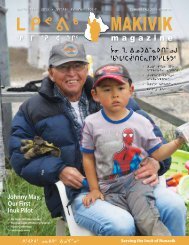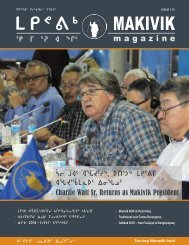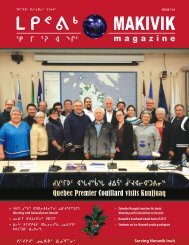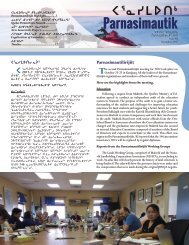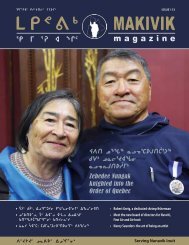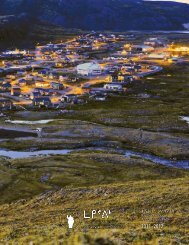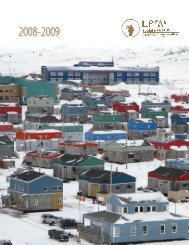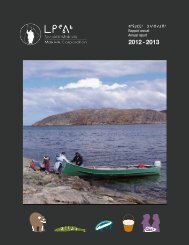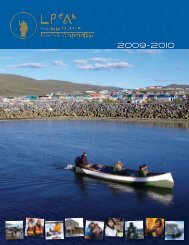2013-2014 Makivik Annual Report
The 2014 Makivik Annual Report
The 2014 Makivik Annual Report
You also want an ePaper? Increase the reach of your titles
YUMPU automatically turns print PDFs into web optimized ePapers that Google loves.
ᐱᓇᓱᖃᑎᒌᒍᑎᖃᕐᑐᑦ ᐃᕐᖃᑐᐃᕕᓕᕆᓃᕐᓅᓕᖓᔪᓂᒃ ᓄᐃᑦᓯᒍᑎᖃᓚᐅᔪᔪᑦ ᐊᒥᓱᓂᒃ<br />
ᖃᓄᐃᓕᒋᐊᕆᒍᑎᑦᓴᐅᓂᕋᕐᑕᒥᓐᓂᒃ: ᐃᕐᖃᑐᐃᕕᒻᒥ ᐱᓇᓱᑦᑏᑦ ᐱᓇᓱᒐᖏᑦ ᐃᓱᓕᑦᑕᓃᕈᓪᓗᒋᑦ<br />
ᑕᓯᐅᔭᕐᔪᐊᒥ, ᐃᕐᖃᑐᐃᔨᐅᑉ ᐱᓇᓱᒐᖓᓂᒃ ᓄᓇᕕᒻᒨᓕᖓᔪᒥᒃ ᐃᓱᓕᑦᑕᓂᖃᖕᖏᑐᒥᒃ<br />
ᓄᐃᑕᐅᔪᖃᕐᓗᓂ, ᐱᐅᓂᕐᓴᓂᒃ ᐃᓱᐊᖁᑎᑖᕐᓗᒋᑦ, ᑲᔪᓯᑎᑕᐅᓂᖃᕐᓗᑎᓪ ᓴᕿᔪᖅ<br />
ᐱᓇᓱᒍᑎᓕᐊᖑᒪᔪᓪᓗ ᐊᓯᖏᓪᓗ. ᐊᒥᓱᑦ ᓱᓕ ᐊᑐᓕᕐᑎᑕᐅᓂᖃᕐᓗᑎᒃ ᑲᔪᓯᓂᖃᕆᐊᖃᕐᒪᑕ.<br />
ᐃᕐᖃᑐᐃᕕᓕᕆᓂᕐᓅᓕᖓᔪᓂᒃ ᐱᓇᓱᖃᑎᒌᒍᑎᖃᕐᑐᑦ ᖃᓄᐃᓕᒋᐊᖁᔭᐅᒍᑎᖏᑕ<br />
ᓯᕗᓪᓕᐹᓪᓚᕆᖓᑦ ᐃᓕᖓᕗᖅ ᓴᕿᔪᖅ ᐱᓇᓱᒍᑎᓄᑦ. ᐃᓗᓐᓈᒍᑦ ᓯᕗᓂᖃᕈᑕᐅᒻᒪᑕ<br />
ᓴᕿᔪᖅ ᐱᓇᓱᒍᑏᑦ ᐱᑕᖃᕐᑎᓯᔨᐅᓂᐊᕐᓗᑎᒃ ᐊᑦᔨᒌᓂᒃ ᐱᓇᓱᒍᑎᖃᕐᓂᓂᒃ ᐃᓚᐅᑎᑦᓯᔪᓂᒃ<br />
ᐃᓘᓐᓇᖏᓐᓂᒃ ᓄᓇᓕᓐᓂᓗ, ᓄᓇᓕᓕᒫᑎᒍᓪᓗ ᓄᓇᓕᕐᓚᑯᓪᓗᐊᓛᑦ ᑕᒪᒃᑯᓄᖕᖓᓕᖓᔪᓂᒃ<br />
ᐱᒐᓱᐊᕈᑎᓕᓐᓂᒃ ᓯᕗᓂᖃᕈᑎᒋᑦᓱᒋᑦ ᑲᔪᓯᑎᑦᓯᒍᑎᐅᓂᐊᕐᑎᓗᒋᑦ ᐊᑑᑎᖃᑦᓯᐊᑐᓂᒃ<br />
ᐋᕐᕿᒍᑎᑦᓴᓂᒃ ᐊᓐᓂᑭᓕᑎᕆᒍᑎᐅᒐᔭᕐᓱᑎᒃ ᓱᒃᑯᓇᕐᑐᓂᒃ ᐱᒃᑫᒍᑎᐅᕙᑦᑕᑦ ᐱᔭᐅᑦᓱᑎᒃ<br />
ᓄᓇᓕᓕᒫᑎᒍᑦ ᐊᖏᔪᒥᒃ ᐃᓅᑦᔪᓯᐅᑉ ᐱᓀᓗᑕᖏᓐᓂᒃ.<br />
ᓴᕿᔪᖅ ᐱᓇᓱᒍᑏᑦ ᐃᓚᒋᔭᐅᑦᓱᑎᒃ ᐱᓇᓱᒍᑎᖃᕆᐊᓯᓂᕐᓄᑦ ᐊᑦᑕᓇᖕᖏᑐᒥᒃ<br />
ᐱᔪᖃᕐᑎᓯᑦᑌᓕᓂᕐᒥᒃ, ᒪᒥᓴᕐᓂᓂᓪᓗ ᓴᐳᑦᔨᓯᒪᓂᕐᒥᓗ ᐱᓇᓱᒍᑎᓂᒃ ᒪᓂᔨᒍᑎᖃᕐᓯᒪᕗᖅ<br />
ᑲᔪᓯᑎᑦᓯᒍᑎᐅᓛᕐᑐᓂᒃ ᐊᑦᑕᓇᖕᖏᑐᓂᒃ ᐱᓴᓱᒍᑎᓂᒃ ᓲᕐᓗ ᐃᓂᓪᓓᒍᑎᐅᓗᑎᒃ<br />
ᐱᓪᓗᑯᒋᐊᓕᓐᓅᓕᖓᓗᑎᒃ ᐃᕐᖃᑐᐃᔨᓂᒃ ᐊᑦᔨᒐᓚᒋᔭᐅᔪᓂᒃ ᑕᒐᑕᒐ ᐊᑐᐃᓐᓇᐅᑎᕙᑦᑕᖏᓐᓄᑦ<br />
ᑯᐯᒃᒥ ᐃᕐᖃᑐᐃᕖᑦ ᒪᓐᑐᔨᐊᒦᑦᑐᑦ ᐃᑦᔭᕋᑦᓴᓯᐊᖑᓂᕋᕐᑕᐅᓯᒪᔪᑦ ᑐᓴᕐᑎᓯᒍᑎᒋᑦᓱᒋᑦ<br />
ᐊᓪᓚᓯᒪᔪᖕᖑᓯᒪᔭᖏᑦ ᑯᐯᒃᒥ ᐱᖁᔭᓕᕆᓂᕐᓄᑦ ᐱᓇᓱᒐᖃᕐᕕᖁᑕᐅᔫᑉ.<br />
ᑕᒐᑕᒐ ᐱᓇᓱᒍᑎᑦᓴᐅᑎᓪᓗᒋᑦ ᐊᑐᐃᓐᓇᕈᕐᑕᐅᒪᔪᑦ ᓯᕗᓂᖃᕈᑎᐅᕗᑦ ᑲᔪᓯᑎᑦᓯᒍᑎ-<br />
ᐅᓚᕐᑎᓗᒋᑦ ᓴᕿᔪᖅ ᐱᓇᓱᒍᑎᓂᒃ, ᑖᒃᑯᐊ ᐱᔭᕇᕐᑕᐅᕙᓪᓕᐊᓕᕐᑐᑦ ᓂᕆᐅᑉᐳᒍᓪᓗ<br />
ᐅᑦᑐᕋᐅᑕᐅᒋᐊᖕᖓᓂᖏᑦ ᐱᒋᐊᕐᑎᑕᐅᓂᖃᑦᓴᐅᑎᒋᓛᓕᕐᑎᓗᒋᑦ ᖃᒻᒥᑯᑦ ᑕᕐᕿᓂ<br />
ᓯᕗᓂᑦᑎᓃᑦᑐᓂ.<br />
<strong>2013</strong>-ᖑᑎᓪᓗᒍ, ᓴᕿᔪᖅ ᓄᓇᕕᒃ ᑯᐯᒃᒥ ᐊᑕᐅᑦᓯᑯᕐᑎᓯᓂᕐᓄᑦ ᑲᑎᖕᖓᔨᖏᑦ,<br />
ᐊᐅᓚᑎᖃᕐᓱᑎᒃ ᑲᒪᒋᔭᐅᑦᓱᑎᓪᓗ ᑯᐯᒃ ᑲᕙᒪᒃᑯᑦ ᑐᕐᖃᑕᕐᕕᖓᓄᑦ ᐃᓕᖓᔪᒧᑦ<br />
ᐃᓄᓕᕆᓂᕐᒥᒃ ᐱᑦᔪᔨᒍᑎᓄᑦ ᐅᕕᒐᕐᑐᐃᓗ ᓴᐳᑦᔭᐅᒪᒋᐊᖃᕐᓂᖏᓐᓄᑦ, ᐊᒻᒪᓗ ᓄᓇᕕᒻᒥ<br />
ᓄᓇᓕᓕᒫᑦ ᑲᑐᑦᔮᖃᖃᑎᒌᒍᑎᒋᑦᓱᒋᑦ ᑲᑎᖕᖓᔩᑦ ᓄᐃᑕᐅᓚᐅᕐᓯᒪᕗᑦ ᓯᕗᓂᓕᐅᕐᑕᐅᓱᑎᒃ<br />
©TEEVI MACKAY/MAKIVIK<br />
system by doing better in terms of providing information on the<br />
system, by investing in more infrastructure and resources dedicated<br />
to justice, and by addressing the social causes of growing crime.<br />
Since 2008, the working group on justice in Nunavik, composed<br />
of representatives from <strong>Makivik</strong>, the Kativik Regional Government<br />
(KRG) and the Kativik Regional Police Force as well as from the<br />
ministries of justice and public security discussed the issues related<br />
to justice and public security.<br />
The working group on justice came up with a number of recommendations:<br />
permanent court workers on the Hudson coast,<br />
permanent judge position for Nunavik, better infrastructure,<br />
implementation of Saqijuq Project, etc. Many of them are yet to<br />
be implemented.<br />
One of the main recommendations of the working group on<br />
justice pertains to the Saqijuq Project. The general objective of the<br />
Saqijuq Project is to provide for a common approach involving all<br />
local, regional and provincial stakeholders and aims to implement<br />
practical solutions to reduce the devastating effects caused by the<br />
major regional social problems.<br />
The Saqijuq Project in addition to introducing solid prevention,<br />
healing and support mechanisms proposes the implementation<br />
of concrete actions such as the establishment of a specialized tribunal<br />
similar to the one currently available at the Cour du Québec<br />
in Montréal and exemplified in a report published by the Barreau<br />
du Québec.<br />
Currently the action plan aiming to implement the Saqijuq<br />
Project is being finalized and we expect that the first pilot project<br />
to start in the coming months.<br />
et en s’attaquant aux causes sociales de la criminalité croissante.<br />
Depuis 2008, le groupe de travail sur la justice au Nunavik, composé<br />
de représentants de <strong>Makivik</strong>, de l’Administration régionale<br />
Kativik (ARK), du Corps de police régional Kativik et des ministères<br />
de la Justice et de la Sécurité publique du Québec, se<br />
penche sur les questions liées à la justice et à la sécurité publique.<br />
Le groupe de travail sur la justice a formulé un certain nombre de<br />
recommandations, notamment l’embauche d’auxiliaires juridiques<br />
permanents sur la côte de la baie d’Hudson, la création d’un poste de<br />
juge permanent pour le Nunavik, l’amélioration des infrastructures<br />
et la mise en œuvre du projet Saqijuq. Plusieurs de ces recommandations<br />
attendent toujours d’être mises en œuvre.<br />
L’une des principales recommandations du groupe de travail sur<br />
la justice porte sur le projet Saqijuq visant à établir une approche<br />
concertée de tous les acteurs locaux, régionaux et provinciaux dans<br />
le but de mettre en œuvre des solutions pratiques visant à réduire les<br />
effets dévastateurs causés par les problèmes sociaux dans la région.<br />
Outre la mise en place de mécanismes de prévention, de guérison et<br />
de soutien solides, le projet Saqijuq propose des actions concrètes<br />
comme la création d’un tribunal spécialisé semblable à celui qui<br />
existe déjà à la Cour du Québec à Montréal, et présenté dans un<br />
rapport publié par le Barreau du Québec.<br />
Le plan de mise en œuvre du projet Saqijuq est en cours de<br />
finalisation, et le premier projet pilote devrait démarrer au cours<br />
des prochains mois.<br />
En <strong>2013</strong>, une table de concertation Nunavik-Québec sous la<br />
responsabilité de la ministre déléguée aux Services sociaux et à<br />
la Protection de la jeunesse et du Comité de partenariat régional<br />
du Nunavik a été créé afin de réunir les principaux intervenants<br />
ᒪᑭᕝᕕᒃ • <strong>Makivik</strong> Corporation • Société <strong>Makivik</strong> 93






